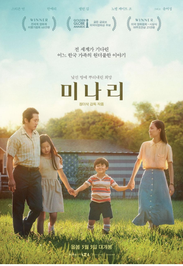Movie Minari review Film, Minari by pancinema Film, Minari by pancinema The film "Minari" is a classic immigrant story with specific details that many people can relate to their life. The story begins when the Korean American father, Jacob(Steven Yeun) of an immigrant family, heads to Asokan, a rural town in the United States, to fulfill his American dream. They came from Korea in the 1980s to live a better life, and As a means of living, they work as a chick gender inspector in a California factory. However, Jacob is disillusioned with his monotonous job and wants to show his daughter, Anne, and six-year-old boy, David, the ideal image of the head of a householder who realized his dream as a farmer. But his wife, Monica(Jeri Han), disagrees with his future goals and wants to return to California for a stable life and treat David's heart disease. The only tension that leads to a calming movie like this classical music is the conflict between Jacob and Monica. Had they not been close-ups and vividly alive descriptions of their strains, this story would have been nothing more than an American dream scenario or a diary for immigrants. One day, they saw the news that a tornado was approaching their 50-acre farmhouse, and Monica's expression was the same as the attitude of the immigrants to the risk they faced in unfamiliar land for the first time. Because the description that evokes empathy is like the autobiography of director Jeong Isaac, an American Korean raised in an immigrant family. Director Jung made the story's climax by not forcing him to put a dramatic element into the screenplay but by introducing Grandma's character in the play. Grandmother, Soonja(Yuh-Jung Yun) came from Korea to take care of her grandchildren instead of Monica. Soonja, a typical Korean grandmother, brings water parsley seeds from Korea and plants them along a nearby stream with her grandchildren. Minari is a familiar Korean herb name and can cook in various foods. It symbolizes the Koreans' ability to adapt quickly and the fortitude to rise again after overcoming difficulties. In the middle, the film shows a little joy that sparkles like our lives in constant tension. Grandmothers from Korea are holding hands and walking along the stream, children laughing on wooden swings made by their mother, and husband fulfilling their dreams with neighbors. All of these spectacles are probably thought of by most immigrants at least once. But conflicts always arise when people who have lived in different backgrounds gather together for a long time. The grandchildren bother the grandmother, who doesn't fit with them, and the son-in-law complains at the mother-in-law, who secretly makes the wife's side. To add insult to injury, Jacob was scammed by the same Korean and lost all the money he had saved for his dreams. This movie tells about life itself. It is like our lives that we must endure and endure numerous hardships and difficulties for a sparkly short time. After many twists and turns, they eventually adapt to the peaceful Asokan, assimilate with their neighbors, and live a life like a movie. This film calmly portrays immigrant families becoming one with nature and the people around them. This film was not an intense stimulus like a poster for incitement or a success story that was not common, but it was a meaningful attempt to remind us that our life itself is a film. From an unfamiliar land in Germany to another strange land in the United States, I look back at the lives of immigrants where every day is a challenge and every hour is tense. At any moment, I realize myself calling me that I am an immigrant artist. When I attend the group exhibition in Mills Pond Gallery last year, I wrote my artist statement like that: Last April, I have finally got an opportunity to attend ArtExpo New York. But the pandemic broke my plan and the event postponed next year. Moreover, I still have been struggling with a hard time since I moved to New York from Germany. As an immigrant artist, everything is a big challenge for me. In spite of the difficulty, art gives me energy for survival and mission for the future. I believe that war and chaos have plagued for a long time, but even the plague passed us for an artistic life. I hope to become a immigrant painter who draws such a Minari-like work that can grow well anywhere and be a portion of good energy for anyone.
0 Comments
Leave a Reply. |
Myungja Anna KohArtist Categories
All
Archives
July 2024
|
Proudly powered by Weebly

 RSS Feed
RSS Feed